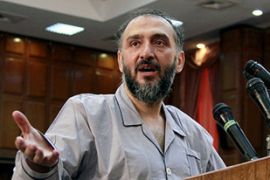Khatami criticises Iran trial
Former president denounces case against those accused of post-election violence.

‘Medieval torture’
“The most important problem with the trial procedure is that it was not held in an open session.
| In video |
  Iranian reformists face trial over poll unrest Iranian reformists face trial over poll unrest Iran opposition angry with Russia Iran opposition angry with Russia |
“The lawyers and the defendants were not informed of the contents of the cases ahead of the trial.”
Mir Hossein Mousavi, the Iranian opposition leader, said protesters’ confessions had been made after they were tortured.
“The scenes that we saw were a clumsy preparation for the launch of the 10th government,” Mousavi said on his website Ghalamnews.
“What are they trying to convince people of … by relying on reports from reporters nobody has heard of and relying on confessions which obviously bore the hallmarks medieval-era torture?
“The torturers’ teeth have reached people’s bones, and now they’re picking [their] victims from among those who have done great services to the country and the Islamic system.”
Reformists on trial
Among those on trial are figures from Iran’s reformist movement, including Behzad Nabavi, a former industry minister and deputy speaker of parliament, Abdollah Ramazanzadeh, a former government spokesman and Mohammad Ali Abtahi, a former vice-president.
| Charge sheet |
|
The defendants appearing in court in Tehran face the following charges:
|
“Most of these charges … seem to be just some kind of a political statement which gives some standard accusations, which they have always stated against opposition figures and opposition protesters,” Farzad Agah, an Iran analyst and former managing director of Iran news watch, told Al Jazeera.
“Yesterday, there were something in the region of 100 people – among them some senior figures belonging to [former] President Khatami’s government – but the thing is there were 80 other people, mainly ordinary people, who had been arrested during the protests following the elections,” he said.
“Obviously not all of them should be given some kind of blanket charge.”
Around 30 people were killed and hundreds wounded in the violence that followed the re-election of Mahmoud Ahmadinejad, Iran’s president, on June 12.
The opposition denounced the election as fraudulent, saying it was stolen from Mir Hossein Mousavi, Ahmadinejad’s main rival.
In the days following the vote about 2,000 protesters, reformists, political activists and journalists were detained amid widespread clashes with police.
‘Tool of enemies’
But Iran’s government has been unable to choke off the protest movement and sustained domestic and international criticism of its crackdown has prompted the authorities to free hundreds of detainees.
About 250 protesters are still being held.
A prosecutor in the trial said at Saturday’s hearing said the opposition was a tool of foreign enemies.
He accused the three biggest opposition parties of receiving money from foreign non-governmental organisations as they plotted an overthrow of the government.
The charges, read out in court by the prosecutor from a 15-page indictment, included attacking military and government buildings, having links with armed opposition groups and conspiring against the ruling system, IRNA, Iran’s official news agency, reported.
‘Ridiculous show’
The indictment described an alleged years-long plot by the top pro-reform political parties to carry out an overthrow of the Islamic Republic.
IRNA reported that during Saturday’s hearing Abtahi, who served in Khatami’s government, confessed to making preparations to foment unrest with other reformist leaders.
“We made extensive exercises to keep people in the streets because it would make sense within the framework of fraud in elections,” IRNA quoted Abtahi as saying.
Abtahi was also quoted as saying that Akbar Hashemi Rafsanjani, a former president, had backed Mousavi to take revenge on Ahmadinejad, who defeated him in the 2005 election, and Ayatollah Ali Khamenei, the supreme leader.
Rights groups have said such confessions are often obtained under duress in Iran.
Opposition groups have denounced the trial with the Islamic Iran Participation Front calling it “disgusting” and a “ridiculous show”.
The trial comes just days before Ahmadinejad is to be sworn into his second term.